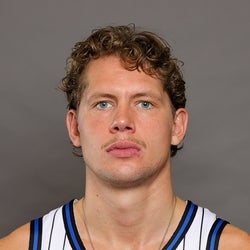2025 Stats
PTS
9.7
REB
2.3
AST
1.0
STL
0.7
BLK
0.0
ROS Projections
2025 Fantasy Outlook
Wagner was in the midst of a career campaign in Orlando before an ACL tear in December cut his season short after 30 games. He averaged 12.9 points, 4.9 rebounds, 1.4 assists, 0.9 three-pointers and 0.8 steals across 18.8 minutes on 56/36/72 shooting, providing solid deep-league value in a limited run. Despite his injury, the Magic re-signed him to a one-year, $5 million deal. His timetable remains unclear, though it's hard to imagine he'll be a full go at the beginning of the season. He'll be returning to an Orlando roster that looks very similar, but he'll face competition for backup center minutes with Jonathan Isaac and Goga Bitadze behind Wendell Carter. So while he can fill a stat sheet in a hurry, multiple factors are working against him as a fantasy asset. Read Past Outlooks

Available for Thursday
Wagner (rest) will be available for Thursday's game against Charlotte.
ANALYSIS
Wagner was held out of Sunday's game against the Grizzlies for injury management related to his previous knee injury. He's no longer appearing on the injury report, however, and he could see a handful of rotation minutes against Charlotte.
Wagner was held out of Sunday's game against the Grizzlies for injury management related to his previous knee injury. He's no longer appearing on the injury report, however, and he could see a handful of rotation minutes against Charlotte.
NBA Per Game Stats
Per Game
Total
Per 36
NBA Per Game Stats
Loading Per Game Stats...
2025 NBA Game Log
2025
2024
2023
2022
2021
2020
2019
2018
2025 NBA Per Game Split Stats
Schedule
By Month
Starting/Off Bench
Days Rest
Vs Opp
By Result
2025 NBA Per Game Split Stats
Loading Split Stats...
Advanced Stats
Loading Advanced Stats...
Stat Review
2025
2024
2023
2022
2021
2020
2019
2018
How does Moritz Wagner compare to other players?
This section compares his stats with all players from the previous three seasons (minimum 200 minutes played)*. The bar represents the player's percentile rank. For example, if the bar is halfway across, then the player falls into the 50th percentile for that stat and it would be considered average.
True Shooting %
73.8%
Effective Field Goal %
67.6%
3-Point Attempt Rate
41.2%
Free Throw Rate
35.3%
Offensive Rebound %
0.0%
Defensive Rebound %
20.0%
Total Rebound %
9.9%
Assist %
12.8%
Steal %
2.2%
Block %
0.0%
Turnover %
11.6%
Usage %
24.4%
Fantasy Points Per Game
15.0
Fantasy Points Per Minute
1.2
NBA Historical Fantasy Stats
Historical ADP
Loading Historical ADP...
Magic Depth Chart
Our full team depth charts are reserved for RotoWire subscribers.
Subscribe Now
Magic Rotation: Minutes Breakdown
Loading Magic Rotation Data...
Average Fantasy Points
Minutes
FanDuel
DraftKings
Yahoo
FantasyDraft
Head2Head
Sorare
Average Fantasy Points are determined when Moritz Wagner was active vs. non-active during the season. Click here to view average fantasy points for a different time period.
Loading Average Minutes...
Past Fantasy Outlooks
2024
2023
2022
2021
2020
2019
2018
Wagner is coming off a strong season where he helped power the Magic to a fifth-place finish in the East for their first playoff appearance since 2019-20. He thrived as the first big man off the bench and averaged a career-best 10.9 points on 60.1 percent shooting from the field in 17.7 minutes per game, which is only the third-highest mark in his six-year career. Wagner had more than a few standout performances on the offensive end during the regular season, including 18 games with more than 15 points and four games with more than 20. He turned in a season-high 27 points on 9-for-13 shooting, including 1-for-3 from deep and 8-for-9 from the foul line in a home win over the Celtics in November. Additionally, he racked up at least 10 rebounds on four occasions, including three double-doubles, and he also recorded three games with at least three assists and no turnovers. Wagner was relatively limited in the postseason, where he averaged 6.3 points, 4.4 rebounds, 0.9 blocks and 1.1 turnovers in 15.1 minutes through seven games against the Cavaliers. After locking in a two-year, $22 million deal in the offseason, he is set to remain a key part of the up-and-coming Magic core and has room to grow in his role. Wagner also averaged 9.8 rebounds, 3.7 rebounds and 2.0 assists in 17.0 minutes per game over six appearances for Germany during the 2024 Paris Olympics.
More Fantasy News

Won't play Sunday
Wagner has been ruled out for Sunday's game against the Grizzlies in London due to left knee injury management.
ANALYSIS
Subscribe now to instantly reveal our take on this news.
Subscribe now to instantly reveal our take on this news.

Light minutes in season debut
Wagner (knee) registered eight points (3-7 FG, 0-2 3Pt, 2-2 FT), two rebounds and two assists across 10 minutes in Sunday's 128-118 win over the Pelicans.
ANALYSIS
Subscribe now to instantly reveal our take on this news.
Subscribe now to instantly reveal our take on this news.

Making season debut Sunday
The Magic announced that Wagner (knee) will be available to make his season debut Sunday against the Pelicans.
ANALYSIS
Subscribe now to instantly reveal our take on this news.
Subscribe now to instantly reveal our take on this news.

Won't play Friday
Wagner (knee) is out for Friday's game against the 76ers.
ANALYSIS
Subscribe now to instantly reveal our take on this news.
Subscribe now to instantly reveal our take on this news.

Won't suit up Wednesday
Wagner (knee) has been ruled out for Wednesday's game against the Nets.
ANALYSIS
Subscribe now to instantly reveal our take on this news.
Subscribe now to instantly reveal our take on this news.
Latest Fantasy Rumors

Provides update on knee
Wagner, who has been sidelined for one year with his ACL injury, said Wednesday that he's eyeing a return soon, Jason Beede of the Orlando Sentinel reports.
ANALYSIS
"I'm doing really good," Wagner said. "I'm feeling really good about where I'm at, finding the joy again of playing basketball and enjoying the process a little more." Orlando hasn't provided a substantial update on Wagner in a while, but the franchise will surely be looking forward to his return after his productive showing in 2024-25 prior to his injury.
"I'm doing really good," Wagner said. "I'm feeling really good about where I'm at, finding the joy again of playing basketball and enjoying the process a little more." Orlando hasn't provided a substantial update on Wagner in a while, but the franchise will surely be looking forward to his return after his productive showing in 2024-25 prior to his injury.


